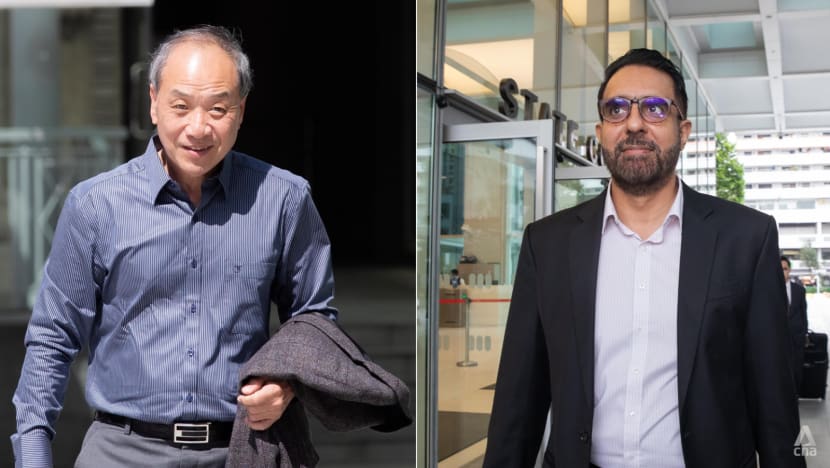CNA Explains: Could Low Thia Khiang have refused to testify in Pritam Singh's trial?
Can a person refuse to be called as a witness? Will they get time off work to testify? Lawyers answer some frequently asked questions about witnesses in a trial.

Mr Low Thia Khiang (left) testified as a prosecution witness in the trial of his successor, Pritam Singh. (Photos: CNA/Ili Nadhirah Mansor)

This audio is generated by an AI tool.
SINGAPORE: Former Workers' Party (WP) chief and seasoned opposition politician Low Thia Khiang made headlines after he took the stand as a prosecution witness in the trial of his successor, Pritam Singh.
Before and after his brief turn on the stand last week, online voices were buzzing about why he might have chosen to testify against Singh, and whether he could have declined to be a witness for the prosecution.
CNA spoke to lawyers who have handled trials to address this and other questions about the process of being a witness in a criminal trial.
How are witnesses identified?
The process begins at the investigations stage, said Mr Anil Balchandani of Red Lion Circle Advocates and Solicitors.
"In criminal matters, the police usually will conduct investigations and identify witnesses," said Mr Balchandani, who is known for securing the acquittal of Ms Parti Liyani, the former maid of then-Changi Airport Group chairman Liew Mun Leong.
Neither the prosecution nor the defence can exclude or "chope" – using a Singlish term for "reserve" – witnesses from the other party, he added.
The police have the power to require witnesses to attend court under Section 21 of the Criminal Procedure Code. If the witness does not show up, a warrant could be issued by a magistrate.
"When interviewed by the police, a witness is bound to state truly what he knows of the facts and circumstances of the case," said Mr Balchandani.
However, the witness has the right to remain silent if what he says would expose him to a criminal charge, for example.
Whoever the police interviews as part of their investigations may potentially be called as a witness, said Mr Mark Yeo, director at Fortress Law and former deputy public prosecutor.
"When preparing for the trial, the prosecution would consider what facts they need to prove their case beyond a reasonable doubt. They will then consider what type of evidence (whether documentary or from oral testimony) they require to prove those facts. They will then decide which witnesses they would need to call," he said.
Under directions from the prosecution, the investigating office will apply to the court for a summons to appear in court, which is then personally served on the witness by the investigating officer, said Mr Yeo.
"That witness will then be under an order to attend court on the date and time specified in the summons."
Can a person refuse to be called as a witness?
Technically yes, said Ms Harjeet Kaur, senior associate at Withers KhattarWong.
But if the witness refuses, the prosecution or defence can issue a Summons To a Witness. Once this is served, failing to attend court will be a breach of the summons, which is a court order, said Mr Yeo.
The court may issue a warrant of arrest and the witness is liable for contempt of court.
Veteran lawyer Ramesh Tiwary said "nobody has a choice" in terms of being a witness, whether for the prosecution or defence.
"Once you are subpoenaed to attend, you have to attend."
Asked if anyone has ever fled before, he said: "I think at least once, there was a witness who, midway through cross-examination, just returned to their own country."
Nothing could be done then, as the person was out of Singapore authorities' jurisdiction.
How do the prosecution and defence pick their witnesses?
In preparation for trial, the prosecution will strategise and identify witnesses for their case, find a suitable schedule and seek trial dates accordingly, said Mr Balchandani.
"Similarly, in preparation for when the defence is called, witnesses will be informed by (defence) counsel," he said.
If both the defence and the prosecution want the same witness, the prosecution "has first go". But it does not make a difference, Mr Tiwary said.
"So if I say 'xyz' in my evidence, it doesn't have more value because I'm a prosecution witness, or less value because I'm a defence witness. The label doesn't affect the value.
"But there's a subtle difference in that – if the prosecution calls a witness, then they can't cross-examine their own witness. So they can't ask leading questions, they have to let the witness tell their story in their own way," he said.
In cross-examination, whether by the prosecution or defence, close-ended questions can be asked – such as "Did this happen, yes or no?"
"So in a sense, cross-examination can achieve more," Mr Tiwary said.
He said the prosecution therefore might think about which witness to let the defence call, because this means the prosecution can cross-examine that witness.
"But generally the prosecution calls all the witnesses they require to prove their case," said Mr Tiwary. "The defence calls those witnesses they think can help their case, or sometimes, it might not help your case, but it might make the prosecution's case weaker."
Does a prosecution witness always testify "against" the accused?
While being labelled a "prosecution witness" may give the impression that the witness is "for" the prosecution, it is not necessarily always the case, said Fortress Law's Mr Yeo.
"The prosecution may sometimes be compelled to call a witness who is 'hostile' to the prosecution because they need that witness to establish certain facts. Examples of such witnesses include co-accused persons who have already pleaded guilty," he said.
With the exception of expert witnesses, a witness's role is to provide facts and not opinions. So whether they are a prosecution or defence witness, the facts they give should be neutral, Mr Yeo said.
"Witnesses are obliged either way to tell 'the truth, the whole truth, and nothing but the truth' regardless of whoever they 'support' during the trial."
Witnesses who do not tell the truth face severe consequences, Mr Balchandani said, pointing to the case of Karl Liew, who was jailed for lying to the judge in the Parti Liyani trial.
"There are provisions for spouses to be shielded from disclosing communications made during marriage, but the provisions have limits," the lawyer said.
Can defence counsel speak to prosecution witnesses and vice versa?
At any stage in the proceedings, prosecution and defence counsel may interview any witness or prospective witness, said Ms Kaur.
There are no restrictions against the defence lawyers talking to a prosecution witness, for reasons such as to understand what evidence the witness is going to give at trial, said Mr Paul Loy, partner at WongPartnership.
"Just as there are no restrictions against the prosecution (usually working through the police) interviewing a defence witness in advance of trial," he said.
While both sides are generally obliged to disclose their lists of witnesses, they are also "not precluded from calling additional witnesses in support of their case, or by way of rebuttal witnesses, with the leave of the court".
"It's good to give advance notice so that parties can all prepare. However it can be done, and if there is good reason why this was not done earlier (for example, new evidence coming to light), the court can be understanding," said Mr Loy.
Do witnesses get time off to testify?
Both factual and expert witnesses can get an allowance for things like travel, meals and air transport for testifying under the Criminal Procedure Code (Witnesses' Allowances) Regulations 2010, said Mr Balchandani. But permission must be sought before the witness is called.
Ms Kaur said that if a witness had to apply for annual leave or if their salary was deducted for attending court as a witness, they may be allowed to claim allowance.
Citing Section 5 of the Criminal Procedure Code (Witnesses’ Allowances) Regulations 2010, Ms Kaur said this is an allowance of one-fifth of a witness' monthly earned income for each half day's attendance in court, subject to a minimum of S$25 (US$19) and a maximum of S$350.
"Separately, under Section 8 of the same regulations, you may be allowed transport allowance capped at S$20 per day," she said.
A witness who attends court for three hours or less in a day, excluding the lunch break, is considered to have attended half a day in court, said Ms Kaur.
Supporting documents must be provided to support a witness' claim for allowance.
Mr Yeo said employers are "strongly encouraged to give their staff time off to attend court" since witnesses are typically under a court order to do so.
"Regardless, the prosecution and defence would typically schedule the trial with the availabilities of the witnesses in mind, to ensure that the witnesses would be available to attend court without issue," he said.
















